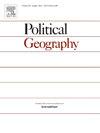Climate change puts an inequitable and heavy burden on people who are forced to adapt to unjust socioenvironmental conditions created by the legacy of ongoing climate coloniality and historical settler and imperial colonialism. However, universalizing climate adaptation discourses fail to conceptualize these historical processes by framing climate change as external to complex social and human systems. A plural reconceptualization of adaptation instead asks us to question what it means to adapt to environmental changes not just under the guise of global climate change, but as embedded in coloniality and settler colonialism in place. Critically engaging with different epistemologies of adaptation and grappling with what it means to do this work in the context of settler colonial realities asks scholars to co-produce knowledges of adaptation that embody place-based histories and human-environmental relations that are too often erased, elided, or appropriated in mainstream Eurocentric adaptation science. In this paper, we draw on an environmental oral history with the Chief of the Lenape Indian Tribe of Delaware to understand how the possibility of indigenous futurity and climate adaptation unfolds towards confronting climate coloniality and efforts to unsettle settler colonialism on stolen lands. Addressing climate coloniality on settler colonial territories suggests that as part of discussing climate change adaptation, scholars should make way for repatriating indigenous knowledges of adaptation and climate change to repair colonial wounds.


